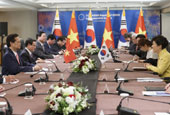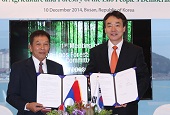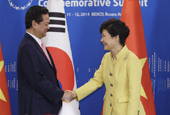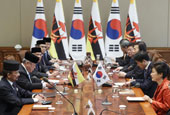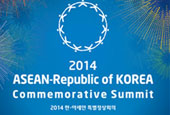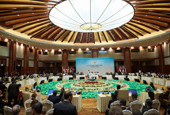View this article in another language
- 한국어
- English
- 日本語
- 中文
- العربية
- Español
- Français
- Deutsch
- Pусский
- Tiếng Việt
- Indonesian
President Park Geun-hye emphasized the need to increase economic cooperation between Korea and the Association of Southeast Asian Nations (ASEAN) at the ASEAN-Republic of Korea (ROK) CEO Summit in Busan on December 11.
The president spoke about the Korea-ASEAN relationship which has continued to make advancements since 1989 when the two first established dialogue. She mentioned the bilateral trade between Korea and ASEAN which exceed USD 130 billion last year, growing from only USD 61 billion in 2006.
“Korea and ASEAN need to combine their strengths and create synergies to infuse new vitality into the economy of both regions,” said the president. She proposed three directions in order to create synergies in this respect.
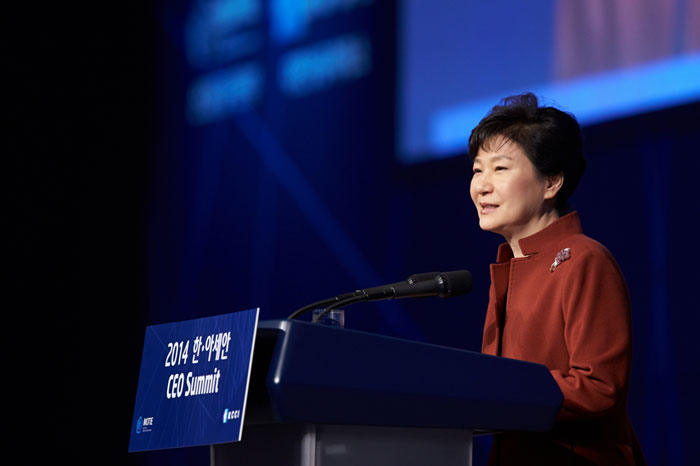
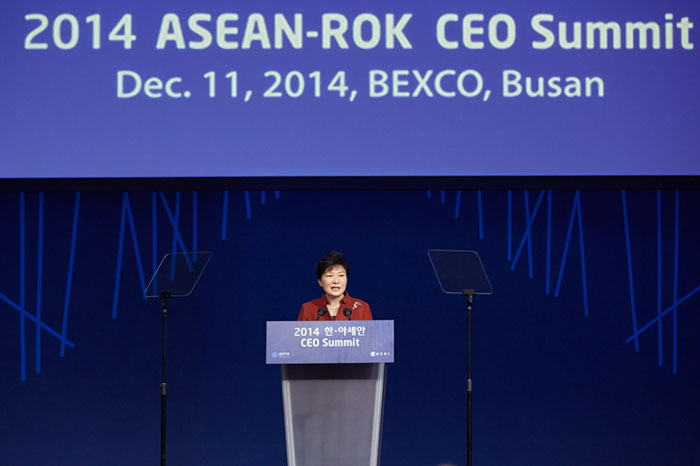
President Park said, “We should continue to work together to help small- and medium-sized enterprises (SMEs) in both regions easily join the global value chain (GVC). Since the conclusion of the Korea-ASEAN FTA, Korean businesses have made increased investments in Southeast Asia, creating a manufacturing network between the two regions across a wide range of areas.” The president urged both conglomerates, which lead the GVCs, and SMEs, which participate in the GVCs, to find ways to work together in a creative manner.
President Park also said that economic cooperation between Korea and ASEAN, which has traditionally focused on energy and manufacturing, has to be expanded to cover the service sector. She mentioned the Korean culture boom, or Hallyu, in the ASEAN region that is being led by K-pop and Korean soap operas, and she noted that food from Southeast Asia is winning popularity here in Korea.
“The recently invigorated cultural exchanges between people in Korea and ASEAN and the promotion of the service industry could help generate much added value and serve as the foundation for cooperation, transcending the barriers of borders.”
In this regard, the president said, “In order for this potential for cooperation to be realized with a tangible outcome, it is most important to get rid of regulations that stand in the way of cooperation and progress in the service industry.” President Park introduced Korea's three-year economic innovation plan which aims at eliminating such regulations. The president told the business people that they should reappraise regulatory reform, saying, “As those directly affected, you can communicate with us and tell us which areas require deregulation. We will work actively to bring improvements, including consulting with ASEAN to incorporate related measures into the Regional Comprehensive Economic Partnership (RCEP) negotiations.”
Finally, President Park said that business opportunities should be extended by further liberalizing the Korea-ASEAN FTA. “ASEAN has been leading regional integration in East Asia through its bilateral FTAs with nations across the region. Unfortunately, the utilization rate of the Korea-ASEAN FTA among Korean businesses is roughly half that seen with other FTAs,” said the president, pointing out that the lack of a high level of liberalization and the complicated rules of origin are the primary reasons.
She welcomed the agreement reached between Korea and ASEAN on trade facilitation and other improvements made to the FTA in various sectors. She said that, “Additional liberalization measures and improved rules of origin will follow so that more businesses can take advantage of the benefits of the FTA.”
By Yoon Sojung
Korea.net Staff Writer
Photos: Cheong Wa Dae
arete@korea.kr

The president spoke about the Korea-ASEAN relationship which has continued to make advancements since 1989 when the two first established dialogue. She mentioned the bilateral trade between Korea and ASEAN which exceed USD 130 billion last year, growing from only USD 61 billion in 2006.
“Korea and ASEAN need to combine their strengths and create synergies to infuse new vitality into the economy of both regions,” said the president. She proposed three directions in order to create synergies in this respect.


President Park Geun-hye delivers the keynote speech at the ASEAN- ROK CEO Summit in Busan on December 11.
President Park said, “We should continue to work together to help small- and medium-sized enterprises (SMEs) in both regions easily join the global value chain (GVC). Since the conclusion of the Korea-ASEAN FTA, Korean businesses have made increased investments in Southeast Asia, creating a manufacturing network between the two regions across a wide range of areas.” The president urged both conglomerates, which lead the GVCs, and SMEs, which participate in the GVCs, to find ways to work together in a creative manner.
President Park also said that economic cooperation between Korea and ASEAN, which has traditionally focused on energy and manufacturing, has to be expanded to cover the service sector. She mentioned the Korean culture boom, or Hallyu, in the ASEAN region that is being led by K-pop and Korean soap operas, and she noted that food from Southeast Asia is winning popularity here in Korea.
“The recently invigorated cultural exchanges between people in Korea and ASEAN and the promotion of the service industry could help generate much added value and serve as the foundation for cooperation, transcending the barriers of borders.”
In this regard, the president said, “In order for this potential for cooperation to be realized with a tangible outcome, it is most important to get rid of regulations that stand in the way of cooperation and progress in the service industry.” President Park introduced Korea's three-year economic innovation plan which aims at eliminating such regulations. The president told the business people that they should reappraise regulatory reform, saying, “As those directly affected, you can communicate with us and tell us which areas require deregulation. We will work actively to bring improvements, including consulting with ASEAN to incorporate related measures into the Regional Comprehensive Economic Partnership (RCEP) negotiations.”
Finally, President Park said that business opportunities should be extended by further liberalizing the Korea-ASEAN FTA. “ASEAN has been leading regional integration in East Asia through its bilateral FTAs with nations across the region. Unfortunately, the utilization rate of the Korea-ASEAN FTA among Korean businesses is roughly half that seen with other FTAs,” said the president, pointing out that the lack of a high level of liberalization and the complicated rules of origin are the primary reasons.
She welcomed the agreement reached between Korea and ASEAN on trade facilitation and other improvements made to the FTA in various sectors. She said that, “Additional liberalization measures and improved rules of origin will follow so that more businesses can take advantage of the benefits of the FTA.”
By Yoon Sojung
Korea.net Staff Writer
Photos: Cheong Wa Dae
arete@korea.kr
